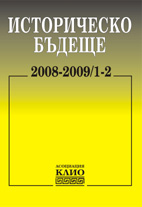Правата на човека: основополагащи документи на ООН и мястото им в българската обществено-политическа среда
Human Rights: Fundamental UN Documents and Their Place in Bulgarian Public and Political Milieu
Author(s): Ognyana HrisimovaSubject(s): History
Published by: Асоциация Клио
Keywords: human rights; United Nations; Covenant on Civil and Political Rights; Convention against Discrimination in Education; Declaration of the Principles of International Cultural Cooperation; minorities
Summary/Abstract: The study is based on the historical method of research of processes ongoing in society in relation to the development of the global set of tools of the United Nations (UN) on the protection of universal and some specific human (civil) rights. Parallel to this, there is a study of the consistent efforts of Bulgarian governments aimed at the application of these rules in the country’s public and political life, as well as a comparative analysis of the standards developed by the UN and the country’s constitutional and other legal provisions. The methods of historical and political science have been used to follow the activity of the UN Commission on Human Rights (replaced by the Human Rights Council) and the fundamental UN documents on this matter have been presented, the UN Charter, the components of the Universal Declaration of Human Rights and the two covenants – on economic, social and cultural rights and on civil and political rights). A comparison is made between the Universal Declaration and the contemporary Constitution of the Republic of Bulgaria, as well as between the Constitution and the Covenant on Civil and Political Rights, from which it becomes obvious that the contemporary constitutional standard of the country is marked by connection with the universal human values proclaimed by the UN. Subsequent documents of the UN or its representative organizations (for example UNESCO) like the Convention against Discrimination in Education, the Declaration of the Principles of International Cultural Cooperation, the Convention on the Prevention and Punishment of the Crime of Genocide, the International Convention on the Liquidation of all Forms of Racial Discrimination, are also incorporated in Bulgaria’s national legislation. Attention is also paid to the special provisions of the international organization on the matter of minorities. The period most active in this respect was that from the end of the 1960s and the 1970s, when the Human Rights Committee developed a series of documents — the Declaration on the Rights of Persons Belonging to National or Ethnic, Religious and Linguistic Minorities, the Declaration on the Elimination of All Forms of Intolerance and of DiscriminationBased on Religionor Belief and others. It is a specific element in the development of Bulgarian public and political life that the latter documents became part of the domestic legislation only after 1990, unlike preceding UN documents.
Journal: Историческо бъдеще
- Issue Year: 2008
- Issue No: 1-2
- Page Range: 163-190
- Page Count: 28
- Language: Bulgarian
- Content File-PDF

